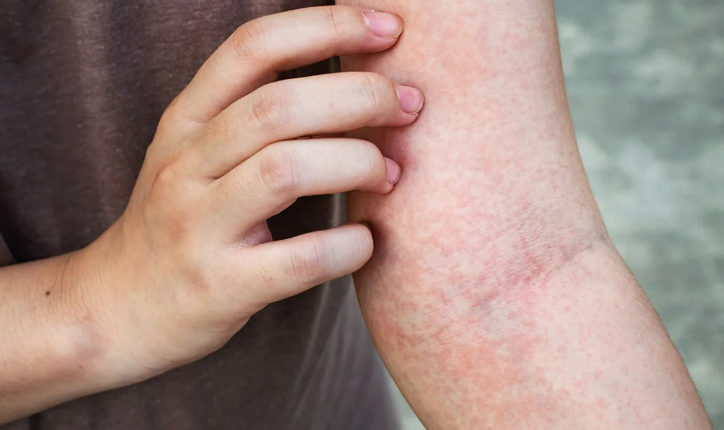Understanding Skin Itching: Causes, Symptoms, and Remedies
Introduction
Skin itching, medically known as pruritus, is a common condition that can affect anyone at any time. It ranges from a mild annoyance to a severe, persistent problem that can significantly impact a person’s quality of life. Understanding the causes, symptoms, and treatment options for skin itching is crucial for effective management and relief.
What is Skin Itching?
Itching is an uncomfortable sensation on the skin that triggers the urge to scratch. While it is often a temporary issue, chronic or intense itching can lead to further skin damage, such as redness, swelling, and even infection if scratched excessively.
Common Causes of Skin Itching
- Dry Skin: One of the most common causes of itching is dry skin, particularly during colder months when humidity levels drop. Dry skin may appear rough, flaky, and sometimes cracked.
- Allergic Reactions: Skin itching can result from allergic reactions to certain foods, medications, or environmental factors like pollen, pet dander, or dust mites. Contact dermatitis, which occurs when the skin reacts to substances like soaps, detergents, or fabrics, can also cause itching.
- Insect Bites and Stings: Mosquito bites, bee stings, and other insect encounters can cause localized itching, often accompanied by redness and swelling at the site of the bite or sting.
- Skin Conditions: Chronic skin conditions like eczema, psoriasis, and dermatitis are known for causing intense itching. These conditions often involve inflammation and can lead to the development of rashes, blisters, or scaly patches on the skin.
- Infections: Fungal infections (e.g., athlete’s foot, ringworm), bacterial infections (e.g., impetigo), and viral infections (e.g., chickenpox) can cause itching as a primary symptom.
- Internal Diseases: Sometimes, itching can be a symptom of internal health issues, such as liver disease, kidney failure, thyroid problems, or certain types of cancer. This type of itching often affects the entire body rather than a specific area.
- Medications: Certain medications, including antibiotics, antifungal drugs, and opioids, can cause itching as a side effect. In some cases, this itching may be due to an allergic reaction to the medication.
- Psychological Factors: Stress, anxiety, and other psychological conditions can sometimes manifest as physical symptoms, including skin itching.
Symptoms Associated with Skin Itching
While itching itself is a symptom, it is often accompanied by other signs, including:
- Redness or rash
- Dry, cracked skin
- Swelling
- Blisters or bumps
- Flaky or scaly skin
- Dark or thickened patches of skin (in chronic cases)
The severity of itching can vary, ranging from mild discomfort to an intense, persistent urge to scratch.
When to See a Doctor
Itching that lasts more than a few weeks, doesn’t improve with self-care measures, or is accompanied by other concerning symptoms (such as weight loss, night sweats, or fever) should be evaluated by a healthcare professional. Persistent itching could indicate an underlying condition that requires medical treatment.
Home Remedies and Treatment Options
- Moisturizers: Regular use of moisturizers can help relieve itching caused by dry skin. Look for fragrance-free, hypoallergenic products that are designed for sensitive skin.
- Cold Compresses: Applying a cold compress to the itchy area can provide immediate relief by numbing the skin and reducing inflammation.
- Oatmeal Baths: Colloidal oatmeal baths can soothe irritated skin and reduce itching, especially in cases of eczema or dry skin.
- Topical Creams: Over-the-counter hydrocortisone creams or calamine lotion can be effective in treating itching associated with insect bites, mild allergic reactions, or localized rashes.
- Antihistamines: Oral antihistamines, such as diphenhydramine (Benadryl) or cetirizine (Zyrtec), can help reduce itching caused by allergies.
- Avoid Triggers: Identifying and avoiding triggers, such as certain foods, fabrics, or skincare products, can prevent recurrent episodes of itching.
- Proper Skin Care: Maintaining a consistent skincare routine that includes gentle cleansing, moisturizing, and avoiding harsh chemicals can help prevent itching.
- Stress Management: If itching is related to stress or anxiety, practicing relaxation techniques such as meditation, deep breathing, or yoga may help reduce symptoms.
Medical Treatments
If home remedies do not provide relief, or if the itching is due to an underlying health condition, medical treatment may be necessary. Depending on the cause, a doctor may prescribe:
- Prescription-strength corticosteroids for severe inflammation.
- Antibiotics or antifungal medications for infections.
- Immunosuppressants for autoimmune skin conditions.
- Light therapy for chronic conditions like psoriasis.
Conclusion
Skin itching is a common problem that can have a variety of causes, from dry skin to serious health conditions. Understanding the underlying cause is key to effective treatment. While home remedies can provide relief in many cases, persistent or severe itching should be evaluated by a healthcare professional to rule out any underlying health issues. By following a proper skincare routine, avoiding known triggers, and seeking medical advice when necessary, you can effectively manage and alleviate skin itching.


